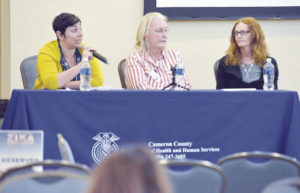When Cameron County Health Authority’s Dr. James Castillo stood up yesterday to speak at a Zika conference on South Padre Island, there was at least one expectation in the audience he would be asked a question that would stump him.
Castillo did not miss a beat, even when asked about specific circumstances.
“Some questions were about people who wanted to purposefully get infected so that if they planned on becoming pregnant in the future, they’ve already had it, a sort of old-fashioned way about getting chicken pox,” Castillo said. “I was able to address why that would be a bad idea.”
One reason would be because of the rare but serious side effects of Zika, such as Guillain-Barre syndrome, an autoimmune disease affecting the nervous system.
Another would be because the person becomes another source of transmission for the virus.
The participants were people from a variety of backgrounds — physicians, public health officials, public information officers, vector control staff and even some city officials.
“It was great to see so many people from other states and other parts of Texas to share what we learned in responding to the virus in our community,” Castillo said.
El Paso educator Lelia Onsurez shared her thoughts about the role of educators during a panel discussion on the virus.
“When it comes to adversity, schools are the first contact with a lot of parents and their children,” Onsurez said. “The problem begins with us and it ends with us.”
Onsurez was referring to educating students on how the virus can be sexually transmitted, and so by educating them on the risks, they can avoid getting the disease.
Sex education can be a touchy issue, but every Zika scenario involved needs to be discussed to prevent it, Health Administrator Esmeralda Guajardo said.
That includes keeping up to date on the newest information about the virus.
Research is showing that in some pregnant women, the virus can continue to be present in their blood for months. Initially, it was believed that the virus would stay no longer than a few weeks.
“This really changes (the importance of) how you get the infection. Not being able to pin down when you got it is challenging,” Castillo said.
This new development has not changed recommendations for couples planning to start a family.
“I would like to see that but … what you would tell them is that they have a low risk of acquiring Zika, and there are lots of things you can do to protect from getting Zika,” Castillo said. “Zika is something you can actually manage and is very similar to taking folic acid to reduce the chance of birth defects.”
Preventative measures include avoiding travel to a high-risk area, wearing long-sleeve clothing and a mosquito repellant, and using protection during sex.
A vaccine also is in the works. Testing should be conducted soon, and although nobody can be sure it will work, researchers are optimistic, Castillo said.
This is because the Zika virus is similar to other viruses spread by mosquitoes, such as dengue and yellow fever.
At the end of the conference, Guajardo encouraged her peers to indicate in their feedback whether they would want more public health conferences.
“As a health director, I think it would be a good idea to have a conference for any public health crisis, so that we could learn from the people out in the field and examine those thoughts and experiences,” Guajardo said.





